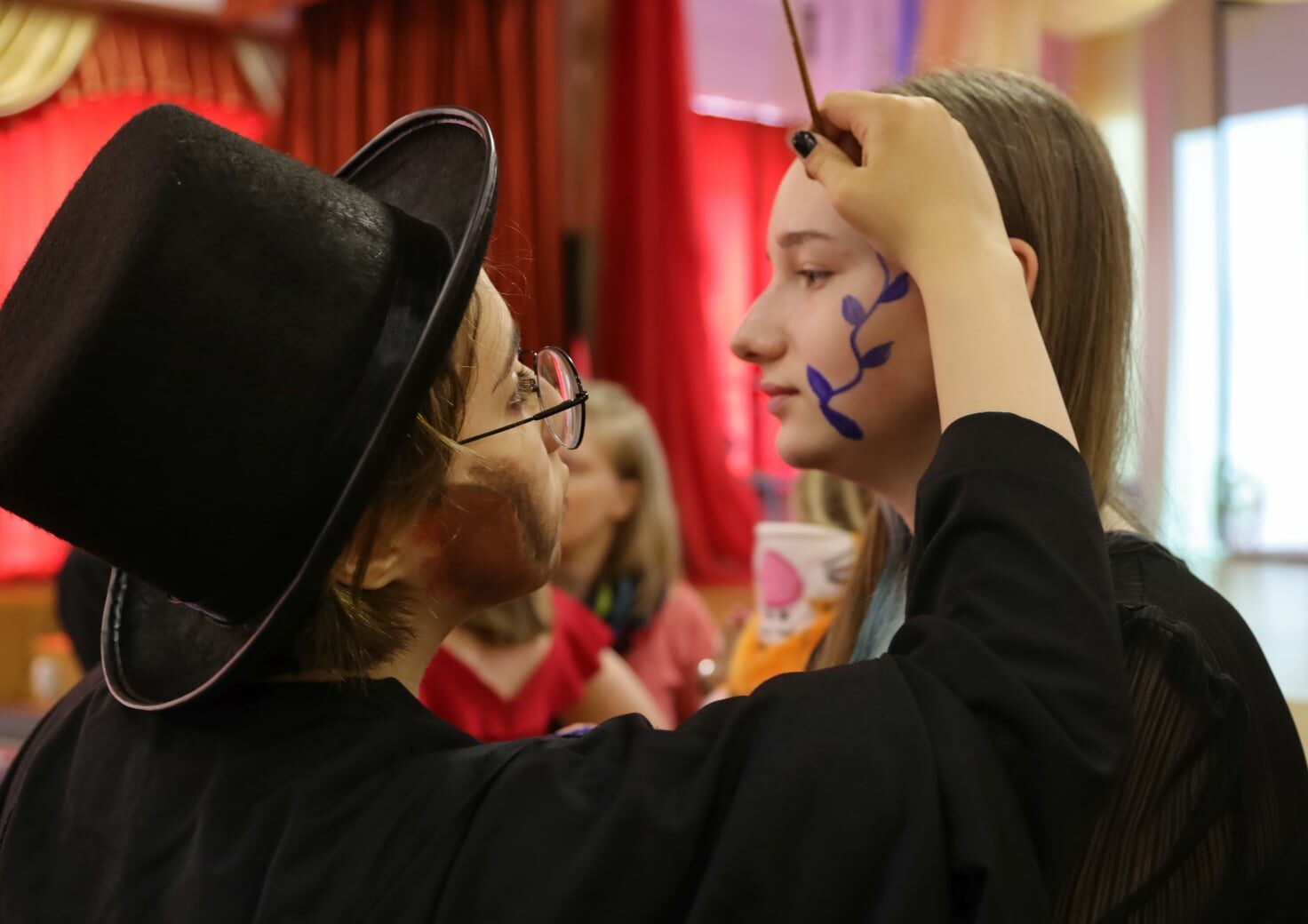Full Title of the Project
Theatre as an Activity-Based Technology for Education and the Formation of Personal Learning Outcomes
Project Goal
To substantiate the requirements for organizing adolescent theatre as a tool for education and the development of personal learning outcomes.
Research Objectives
- To examine key approaches to organizing theatrical activity as a means of teaching and educating adolescents.
- To conduct an experimental study on the specifics of organizing theatrical activity aimed at shaping personal learning outcomes in adolescents.
- To formulate requirements for organizing theatrical activity as a tool for education and upbringing in adolescence.
Research Design
Stage 1 (October – December 2021). Introduction of adolescents and teachers to the project goals. Baseline diagnostics. Development of digital storytelling skills. Work on a play script based on The Government Inspector by N.V. Gogol.
Stage 2 (January – April 2022). Acting and directing training sessions, development of communication and organizational skills. Work on staging The Government Inspector. Final diagnostics.
Stage 3 (May – June 2022). Processing of empirical data and formulation of research findings.
During the study, the research team:
- conducted comprehensive diagnostics of the following indicators: value orientations, motivation, group cohesion, reflection (including self-reflection and social reflection), communication and organizational abilities;
- carried out 20 integrated sessions with the theatre project group;
- staged the play “Gogol. The Government Inspector. Scenes” together with the adolescents.
Research Methods
- Observation of theatrical activity with adolescent participation;
- Video recording and subsequent analysis of training sessions;
- Analysis of creative products (scripts, animated films, epigrams, etc.);
- Regular interviews with adolescents and teachers involved in the project;
- Reflexive diaries, in which adolescents analyzed their contribution to the sessions, evaluated their emotional state during and after the sessions, and noted behavioral changes in themselves and their peers.
Research Tools
- Interpersonal Communication Skills Scale (Learning Dynamics, 2002).
- Communicative and Organizational Inclinations Test (V.V. Sinyavsky, V.A. Fedoroshin).
- Seashore’s Group Cohesion Test.
- School Motivation Test (N.G. Luskanova, 1993).
- Questionnaire on learning motivation for students in Grades 5–11.
- M. Rokeach’s Value Orientation Test.
- M. Grant’s Methodology for Studying Reflection.
- A.V. Karpov’s Reflexivity Questionnaire.A set of questionnaires developed by O.V. Rubtsova and T.A. Poskakalova to study participants’ perception of theatre activity, their attitudes toward theatre, and the experience gained from participating in the project:
a) “Theatre in My Life”
b) “My Perception of the Project: Gogol, School Theatre, and My Personality”
Research Sample
Experimental group: 10 adolescents aged 14–15.
Control group: 23 adolescents aged 14–15.
Research Site
Starogorodkovskaya Secondary School.
Over the course of the project, the research team analyzed:
- more than 24 hours of video materials;
- over 30 interviews with adolescents and teachers;
- more than 56 reflexive diaries.
Preliminary Findings
Theatrical activity in school practice can contribute to:
- group cohesion, resolution of interpersonal conflicts, and readiness to participate in the life of others and society as a whole;
- the development of moral values and active civic engagement;
- the development of communication and reflective skills, as well as the ability to work within child–adult communities.
Publications Based on the Study
- Rubtsova, O.V., Poskakalova, T.A., Solovyeva, A.G. Theatre as an Activity-Based Technology for Education and the Formation of Personal Learning Outcomes. Psychological Science and Education, 2022, Vol. 27, No. 1, pp. 52–64. DOI: 10.17759/pse.2022270105
- Poskakalova, T.A., Efimova, E.A. The Use of Joe Lambert’s Digital Storytelling Model as a Tool for Creating Cartoons for Educational Purposes in Middle School. Molodoy Ucheny [Young Scientist], 2022, No. 24 (419), pp. 386–389. Available at: https://moluch.ru/archive/419/93075/
- Poskakalova, T.A. Theatrical Activity for Educational Purposes: Experience of African Countries [Electronic resource]. Journal of Modern Foreign Psychology, 2023, Vol. 12, No. 2, pp. 125–136. DOI: 10.17759/jmfp.2023120212
Conference Abstracts
Poskakalova, T.A. Theatrical Games as a Means of Achieving Personal Learning Outcomes of Modern Schoolchildren. In: Russian Science in the Modern World. Proceedings of the XLVIII International Scientific and Practical Conference. Moscow: Nauchnyi-izdatelskii tsentr “Aktualnost.RF”, August 31, 2022, pp. 65–68.
Theses and Dissertations Based on the Project
- Solovyeva, A.G. Theatrical Activity as a Condition for the Development of Cross-Disciplinary Competencies in Adolescence.
- Efimova, E.A. Digital Storytelling as a Tool for Enhancing Learning Motivation in Adolescents. Master’s thesis, Program “Developmental Psychology,” Moscow State University of Psychology & Education, 2022, 91 pp.
The project is a logical continuation of the Multimedia Theatre project, implemented at MSUPE in 2019–2021, which was included in the TOP-100 finalists of the forum “Strong Ideas for a New Time.”


